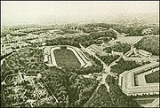
1900 Summer Olympics
Encyclopedia
The 1900 Summer Olympics, today officially known as the Games of the II Olympiad, was an international
multi-sport event
which was celebrated in 1900 in Paris
, France
. No opening or closing ceremonies were held; competitions began on May 14 and ended on October 28. The Games were held as part of the 1900 World's Fair
. Over one thousand competitors took part in 19 different sports. Women took part in the games for the first time and Charlotte Cooper
became the first female Olympic champion. The decision to hold competitions on a Sunday brought protests from many American athletes, who travelled as representatives of their colleges and were expected to withdraw rather than compete on their religious day of rest.
At the Sorbonne
conference of 1895, Baron de Coubertin proposed that the Olympic Games should take place in 1900 in Paris. The delegates to the conference were unwilling to wait five years and lobbied to hold the first games in 1896. A decision was made to hold the first Olympic Games in 1896 in Athens and that Paris would host the second celebration.
Most of the winners in 1900 did not receive medals, but were given cups or trophies. Professionals competed in fencing and Albert Robert Ayat
(France), who won the épée for amateurs and masters, was awarded a prize of 3000 francs
.
Some unusual events were contested for the only time in the history of the Games including automobile and motorcycle racing
, ballooning
, cricket
, croquet
, Basque pelota, 200m swimming obstacle race and underwater swimming.
. The Baron de Coubertin believed that this would help public awareness of the Olympics and submitted elaborate plans to rebuild the ancient site of Olympia
, complete with statues, temples, stadia and gymnasia. The director of the Exposition Universelle, Alfred Picard, thought holding an ancient sport event at the Exposition Universelle was an "absurd anachronism". After thanking de Coubertin for his plans, Picard filed them away and nothing more came of it.
A committee was formed for the organization of the Games, consisiting of some of the more able sports administrators of the day and a provisional program was drawn up. Sports to be included at the games were track and field athletics, swimming
, wrestling
, gymnastics
, fencing
, French
and British boxing
, river and ocean yacht racing
, cycling
, golf
, lifesaving
, archery
, weightlifting, rowing
, diving
and water polo
.
British
and Irish
sports associations announced a desire to compete, as did a number of powerful American universities and sports clubs. Competitors from Russia
and Australia
also confirmed their intentions to travel to Paris.
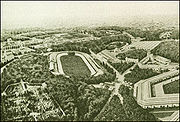 On November 9, 1898 the Union des Sociétés Françaises de Sports Athlétiques
On November 9, 1898 the Union des Sociétés Françaises de Sports Athlétiques
("Union of the French Societies for Athletic Sports" or USFSA) put out an announcement that it would have sole right to any organised sport held during the World's Fair. It was an empty threat but Viscount
Charles de La Rochefoucauld, the nominated head of the organizing committee, stepped down rather than be embroiled in the political battle.
The Baron de Coubertin, who was also secretary-general of the USFSA, was urged to withdraw from active involvement in the running of the Games and did so, only to comment later, "I surrendered - and was incorrect in doing so."
The IOC ceded control of the Games to a new committee which was to oversee every sporting activity connected to the 1900 Exposition Universelle. Alfred Picard appointed Daniel Mérillon, the head of the French Shooting Association as president of this organization in February 1899. Mérillon proceeded to publish an entirely different schedule of events, with the result that many of those that had made plans to compete in concordance with the original program withdrew, and refused to deal with the new committee.
Between May and October 1900, the new organizing committee held an enormous number of sporting activities alongside the Paris Exposition. The sporting events rarely used the term of "Olympic". Indeed the term "Olympic Games" was replaced by "Concours internationaux d'exercices physiques et de sport" ("International physical exercises and sports" in English) in the official report of the sporting events of the 1900 Exposition Universelle. The press reported competitions variously as "International Championships", "International Games", "Paris Championships", "World Championships" and "Grand Prix of the Paris Exposition".
De Coubertin commented later to friends: "It's a miracle that the Olympic Movement survived that celebration".
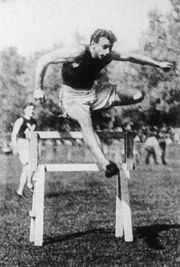
, while 13 new sports were added. Swimming and water polo were considered to be two disciplines within a single sport of aquatics in the Olympic context.
contingent of top-class American collegiate athletes ensured the track and field competitions were of the highest quality. The tennis gold medalists were all former Wimbledon
champions, swimming and fencing events were of a good standard and even polo, a minority sport for the social elite, was well represented by some of the best players in the game. Other sports were noticeably weak in both quality and depth. Only athletics, swimming and fencing had competitors from more than ten nations.
International Olympic Committee currently list six events as having full Olympic status but a case could be made that as many as eight other events as equally as deserving to be considered as part of official Olympic history. About 150 archers competed in these six official events but as many as 5,000 were involved in archery competition in conjunction with 1900 World's Fair. Belgian
Hubert Van Innis
took two gold medals and one silver and would add to his tally twenty years later in Antwerp
.
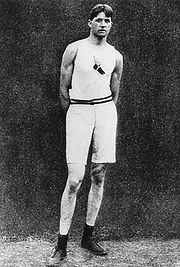
events were held at the home of the Racing Club de France
at the
Croix-Catelan stadium in Bois de Boulogne
. No track was laid and races took place on an uneven
field of grass littered with trees. Additional events were held for professionals and a series of handicap races also took place. These are not considered official Olympic events.
, Princeton University
and the University of Pennsylvania
all won gold medals. Indeed, two would-be dentists from the University of Pennsylvania were amongst the stars of the Games. Alvin Kraenzlein
won 4 individual gold medals, a feat that has never repeated, while Walter Tewksbury took five medals including two golds. The hurdles in the 400 m hurdle race were 30 feet (9.1 m)-long telegraph poles arranged on the track and the race, uniquely in Olympic competition, had a water jump on the final straight.
Only George Orton
, who won Canada
's first Olympic title in the shorter of the two steeplechases
, ruined a perfect record for the British. Orton won his title less than an hour after placing third in the 400 metre hurdles.

, the course was poorly marked out and runners often got lost and had to double back on themselves before continuing. On some parts of the course, runners had to contend with distractions from cars, bicycles pedestrians and animals. Arthur Newton of the United States finished fifth but stated he had not been passed by any other runner during the race. Another American, Richard Grant
, claimed he was run down by a cyclist as he made ground on the leaders. French honour seemed to have been satisfied when Michel Théato
crossed the finish line and a military band struck up La Marseillaise
. However, modern research has revealed that Théato was born in Luxembourg
and maintained Luxembourgian citizenship throughout his life.
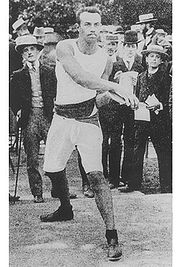
discus throw
er Rudolf Bauer
was only non-American crowned as Olympic Champion. American domination was even greater in the field events than the track events with outstanding performances coming from Ray Ewry
and Irving Baxter
. Ewry started his Olympic career with a sweep of the three standing jumps whilst Baxter finished second to Ewry three times and won both the regular high jump
and pole vault
.

partnerships of Amezola and Villota became their nations' first Olympic champions. The mano form of the game and a chistera tournament for professional players were contested unofficially.
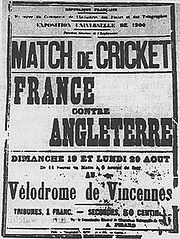
After the withdrawal of teams from the Netherlands
and Belgium
, only two teams played in the cricket tournament. A team made up of players from the Albion Cricket Club and the Standard Athletic Club, two Paris clubs consisting almost exclusively of British expatriates, played a touring team from the southwest of England. The Devon and Somerset Wanderers were no more than a team of competent club cricketers (made up from Blundells School old boys and members of Castle Cary Cricket Club), and only Montagu Toller
and Alfred Bowerman
were deemed good enough to play at county level for Somerset. The game was played before a small crowd at the Vélodrome de Vincennes
. An emphatic second innings bowling performance from Toller captured victory for the visitors as time appeared to be running out for them. If the French had held out for five more minutes the game would have declared a draw. Knowledge of the game would have been lost but for the forethought of John Symes
, a member of the victorious team, who kept a scorecard in his own writing.
for the early stages. An unofficial two-ball handicap competition was also held.
won a gold and a silver. He narrowly missed making Olympic history by winning two medals in the same event. Competing with two different horses in the high jump, he jointly won the gold medal and finished in 4th place on his second horse.
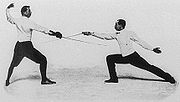
the cutlery exhibit at the 1900 World's Fair. French fencers dominated the proceedings but both Cuba and Italy also took titles. The early rounds of the foil competitions were judged on style rather than the actual result of the contest. This meant that some fencers were eliminated without losing a contest whilst others were defeated and still progressed to the next rounds.
A crowd of around 500 spectators saw them defeat their French rivals.
tournament on an October Tuesday in Paris. She died in 1955 without being aware that the
tournament was part of the Olympic Games and she had become America's first ever female
Olympic champion.
and
weightlifting
as well as gymnastic disciplines
Mexico won its first medal in this sport. Bronze by Guillermo Hayden Wright, and three brothers from Mexico; Eustaquio de Escandón y Barron, Pablo de Escandón y Barron and Manuel de Escandón y Barron, Marquez de Villavieja
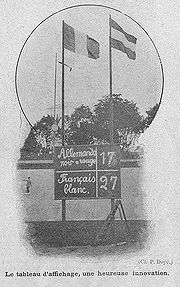
and Moseley Wanderers
from England. The Moseley team had played a full game of rugby in England the day before they made the journey to Paris. They arrived in the morning, played the match in the afternoon and were back in their home country by the next morning. The proposed game between the British and German sides was cancelled and both are credited as silver medallists. The Franco-Haitian centre Constantin Henriquez de Zubiera
become the first black gold medallist. Three months earlier he had competed in the tug of war.
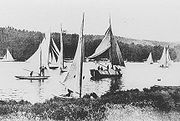
In most classes there were two distinct "finals", boats were assigned time handicaps according to their weight within each class and cash prizes were handed out to the winner of each race. The IOC currently recognizes the winner of the first race in each class as Olympic champion except in the case of the 10-20 ton class, which was decided on aggregate time over three races. Races were held at both Meulan
and Le Havre
and medals shared amongst five nations. France and Great Britain were the most successful of the countries involved. A number of people named as members of medal-winning crews by the IOC have been proved not to have competed; others have their participation seriously questioned by historical research.
was the outstanding marksman of the Games, taking a trio of titles and leading his country to the top of the shooting medal table. The medals were shared between six different nations. There is a debate as to whether the live pigeon shooting event was a full Olympic event, Belgian Leon Lunden shot twenty-one birds on his way to the championship. Up to thirty unofficial shooting events were also held.
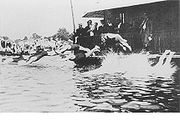
hosted the swimming events in 1900. Run with the current, the races produced very fast times by the standards of the day. John Arthur Jarvis
of Great Britain, Frederick Lane
of Australia and the German Ernst Hoppenberg
each won two titles. Lane received a 50-pound bronze statue of a horse as a prize. A couple of unusual events were held. The obstacle race required both swimming underneath and climbing over rows of boats whilst Charles de Venville stayed submerged for over a minute to
win the underwater swimming event.
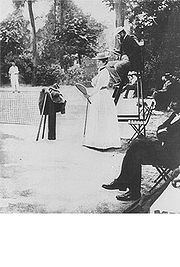
champions reach the semi-finals. Lawrence Doherty reached the final when older brother Reggie
stepped aside and let his sibling advance to the final. The two refused to play other in what they considered a minor tournament. On the 11th of July a landmark was reached in the history of the Olympic Games. Charlotte Cooper
, already three times Wimbledon champion, took both singles and mixed doubles championships to become the first female Olympic champion.
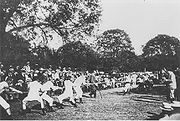
A combined Sweden/Denmark team, made up of three competitors from each country, defeated the
French team to win the title. They were left as the only participating teams after the United
States were unable to take part as three of their team were involved in the final of the hammer.
Edgar Aaybe was a journalist covering the Games for the Danish newspaper Politiken
and was asked to join the team when another puller was taken ill. Constantin Henriquez de Zubiera
was the first black medallist in the history of the Olympics.
scoring 29 goals and conceding only 3 in their 3 matches. In the final, they limited the number
of shots on goal to avoid humiliating their opponents. Thomas William Burgess
of the bronze
medal-winning Libellule de Paris team, represented Great Britain in the swimming events.
. An enormous amount of events were held, though many fall short of the standards later required for Olympic championship status. Decisions as to which Olympic events are termed "official" and which are have "unofficial" or "demonstration" status are usually left to the Olympic organizing committees and/or the IOC. In the absence of any overall authority capable of making an official distinction of this kind, no decision as to the official status of any event was made at the time of the Games. A document from 1912 exists, listing results from the 1900 Games, but the reliability of this paper is questioned by Olympic historians. This document forms the basis of the results of the Paris games in the IOC database.
, but the IOC does not regard them as fully part of the Olympic Games
.
In addition to these 71 schools and 92 military events were also held across a range of sports.
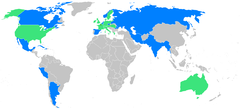
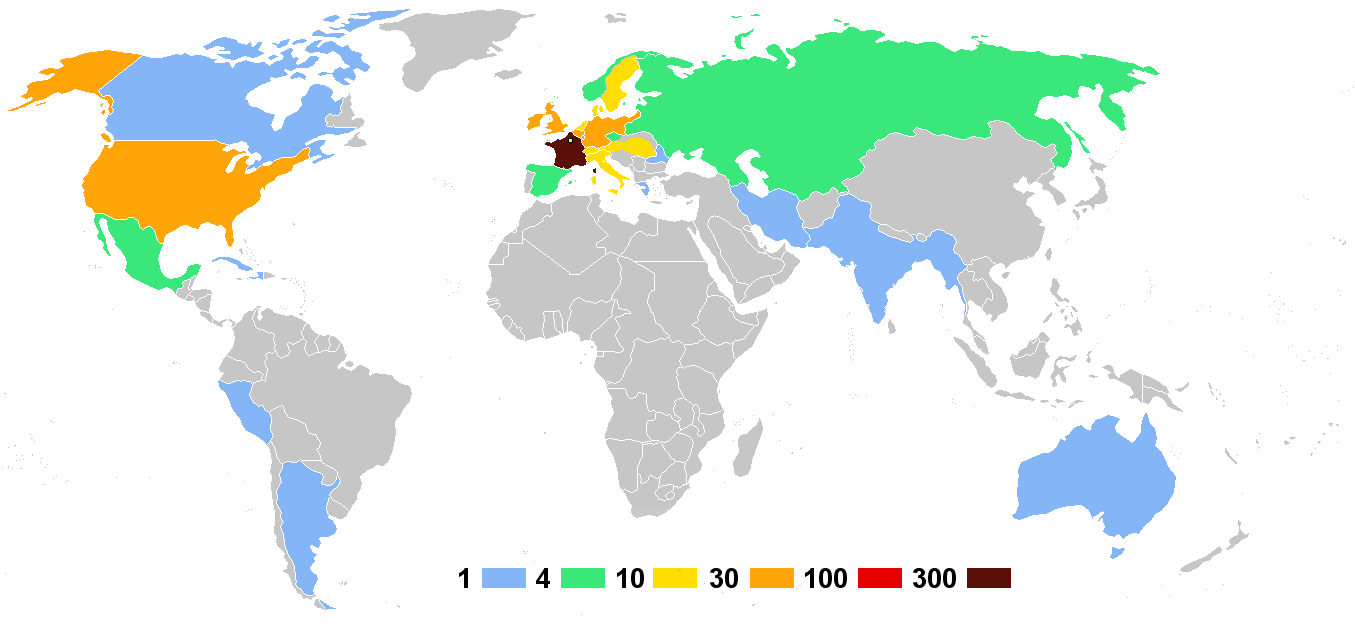 The following 24 nations sent competitors to the 1900 Olympic Games, according to the IOC.
The following 24 nations sent competitors to the 1900 Olympic Games, according to the IOC.
to reflect later practice of awarding such medals to 1st, 2nd, and 3rd place competitors, respectively. Early Olympic Games, such as the 1900 Summer Olympics, had no set schedule of awards.
These are the top ten nations that won medals at the 1900 Games.
International
----International mostly means something that involves more than one country. The term international as a word means involvement of, interaction between or encompassing more than one nation, or generally beyond national boundaries...
multi-sport event
Multi-sport event
A multi-sport event is an organized sporting event, often held over multiple days, featuring competition in many different sports between organized teams of athletes from nation-states. The first major, modern, multi-sport event of international significance was the modern Olympic Games.Many...
which was celebrated in 1900 in Paris
Paris
Paris is the capital and largest city in France, situated on the river Seine, in northern France, at the heart of the Île-de-France region...
, France
France
The French Republic , The French Republic , The French Republic , (commonly known as France , is a unitary semi-presidential republic in Western Europe with several overseas territories and islands located on other continents and in the Indian, Pacific, and Atlantic oceans. Metropolitan France...
. No opening or closing ceremonies were held; competitions began on May 14 and ended on October 28. The Games were held as part of the 1900 World's Fair
Exposition Universelle (1900)
The Exposition Universelle of 1900 was a world's fair held in Paris, France, from April 15 to November 12, 1900, to celebrate the achievements of the past century and to accelerate development into the next...
. Over one thousand competitors took part in 19 different sports. Women took part in the games for the first time and Charlotte Cooper
Charlotte Cooper (tennis player)
Charlotte Reinagle Cooper was a tennis player born in Ealing, Middlesex, England where, as a young woman, she was a member of the Ealing Lawn Tennis Club. She won her first of five Wimbledon championships singles titles in 1895, wearing an ankle-length dress in accordance with proper Victorian...
became the first female Olympic champion. The decision to hold competitions on a Sunday brought protests from many American athletes, who travelled as representatives of their colleges and were expected to withdraw rather than compete on their religious day of rest.
At the Sorbonne
Sorbonne
The Sorbonne is an edifice of the Latin Quarter, in Paris, France, which has been the historical house of the former University of Paris...
conference of 1895, Baron de Coubertin proposed that the Olympic Games should take place in 1900 in Paris. The delegates to the conference were unwilling to wait five years and lobbied to hold the first games in 1896. A decision was made to hold the first Olympic Games in 1896 in Athens and that Paris would host the second celebration.
Most of the winners in 1900 did not receive medals, but were given cups or trophies. Professionals competed in fencing and Albert Robert Ayat
Albert Robert Ayat
Albert Jean Louis Ayat was a French fencer who competed in the late 19th century and early 20th century. He participated in Fencing at the 1900 Summer Olympics in Paris and won the gold medal in the masters épée. He also won the gold medal in the Amateur masters épée final.-References:...
(France), who won the épée for amateurs and masters, was awarded a prize of 3000 francs
French franc
The franc was a currency of France. Along with the Spanish peseta, it was also a de facto currency used in Andorra . Between 1360 and 1641, it was the name of coins worth 1 livre tournois and it remained in common parlance as a term for this amount of money...
.
Some unusual events were contested for the only time in the history of the Games including automobile and motorcycle racing
Motorcycle racing
Motorcycle sport is a broad field that encompasses all sporting aspects of motorcycling. The disciplines are not all "races" or timed-speed events, as several disciplines test a competitor's various riding skills.-Motorcycle racing:...
, ballooning
Ballooning
Ballooning may refer to:* Hot air ballooning* Balloon * Ballooning * Ballooning degeneration...
, cricket
Cricket
Cricket is a bat-and-ball game played between two teams of 11 players on an oval-shaped field, at the centre of which is a rectangular 22-yard long pitch. One team bats, trying to score as many runs as possible while the other team bowls and fields, trying to dismiss the batsmen and thus limit the...
, croquet
Croquet
Croquet is a lawn game, played both as a recreational pastime and as a competitive sport. It involves hitting plastic or wooden balls with a mallet through hoops embedded into the grass playing court.-History:...
, Basque pelota, 200m swimming obstacle race and underwater swimming.
Organization
The 1900 Games were held as part of the 1900 Exposition UniverselleExposition Universelle (1900)
The Exposition Universelle of 1900 was a world's fair held in Paris, France, from April 15 to November 12, 1900, to celebrate the achievements of the past century and to accelerate development into the next...
. The Baron de Coubertin believed that this would help public awareness of the Olympics and submitted elaborate plans to rebuild the ancient site of Olympia
Olympia, Greece
Olympia , a sanctuary of ancient Greece in Elis, is known for having been the site of the Olympic Games in classical times, comparable in importance to the Pythian Games held in Delphi. Both games were held every Olympiad , the Olympic Games dating back possibly further than 776 BC...
, complete with statues, temples, stadia and gymnasia. The director of the Exposition Universelle, Alfred Picard, thought holding an ancient sport event at the Exposition Universelle was an "absurd anachronism". After thanking de Coubertin for his plans, Picard filed them away and nothing more came of it.
A committee was formed for the organization of the Games, consisiting of some of the more able sports administrators of the day and a provisional program was drawn up. Sports to be included at the games were track and field athletics, swimming
Swimming (sport)
Swimming is a sport governed by the Fédération Internationale de Natation .-History: Competitive swimming in Europe began around 1800 BCE, mostly in the form of the freestyle. In 1873 Steve Bowyer introduced the trudgen to Western swimming competitions, after copying the front crawl used by Native...
, wrestling
Wrestling
Wrestling is a form of grappling type techniques such as clinch fighting, throws and takedowns, joint locks, pins and other grappling holds. A wrestling bout is a physical competition, between two competitors or sparring partners, who attempt to gain and maintain a superior position...
, gymnastics
Artistic gymnastics
Artistic gymnastics is a discipline of gymnastics where gymnasts perform short routines on different apparatus, with less time for vaulting . The sport is governed by the Federation Internationale de Gymnastique , which designs the Code of Points and regulates all aspects of international elite...
, fencing
Fencing
Fencing, which is also known as modern fencing to distinguish it from historical fencing, is a family of combat sports using bladed weapons.Fencing is one of four sports which have been featured at every one of the modern Olympic Games...
, French
Savate
Savate , also known as boxe française, French boxing, French kickboxing or French footfighting, is a French martial art which uses the hands and feet as weapons combining elements of western boxing with graceful kicking techniques. Only foot kicks are allowed unlike some systems such as Muay...
and British boxing
Boxing
Boxing, also called pugilism, is a combat sport in which two people fight each other using their fists. Boxing is supervised by a referee over a series of between one to three minute intervals called rounds...
, river and ocean yacht racing
Yacht racing
Yacht racing is the sport of competitive yachting.While sailing groups organize the most active and popular competitive yachting, other boating events are also held world-wide: speed motorboat racing; competitive canoeing, kayaking, and rowing; model yachting; and navigational contests Yacht racing...
, cycling
Cycling
Cycling, also called bicycling or biking, is the use of bicycles for transport, recreation, or for sport. Persons engaged in cycling are cyclists or bicyclists...
, golf
Golf
Golf is a precision club and ball sport, in which competing players use many types of clubs to hit balls into a series of holes on a golf course using the fewest number of strokes....
, lifesaving
Lifesaving
Lifesaving is the act involving rescue, resuscitation and first aid. It often refers to water safety and aquatic rescue however it could include ice rescue, flood and river rescue, swimming pool rescue and other emergency medical services. Lifesaving also refers to sport where lifesavers compete...
, archery
Archery at the Summer Olympics
Archery had its debut at the 1900 Summer Olympics and has been contested in 13 Olympiads. Eighty three different nations have appeared in the Olympic archery competitions, with France appearing the most often at 11 times. It is governed by the International Archery Federation...
, weightlifting, rowing
Rowing (sport)
Rowing is a sport in which athletes race against each other on rivers, on lakes or on the ocean, depending upon the type of race and the discipline. The boats are propelled by the reaction forces on the oar blades as they are pushed against the water...
, diving
Diving
Diving is the sport of jumping or falling into water from a platform or springboard, sometimes while performing acrobatics. Diving is an internationally-recognized sport that is part of the Olympic Games. In addition, unstructured and non-competitive diving is a recreational pastime.Diving is one...
and water polo
Water polo
Water polo is a team water sport. The playing team consists of six field players and one goalkeeper. The winner of the game is the team that scores more goals. Game play involves swimming, treading water , players passing the ball while being defended by opponents, and scoring by throwing into a...
.
British
United Kingdom
The United Kingdom of Great Britain and Northern IrelandIn the United Kingdom and Dependencies, other languages have been officially recognised as legitimate autochthonous languages under the European Charter for Regional or Minority Languages...
and Irish
Ireland
Ireland is an island to the northwest of continental Europe. It is the third-largest island in Europe and the twentieth-largest island on Earth...
sports associations announced a desire to compete, as did a number of powerful American universities and sports clubs. Competitors from Russia
Russia
Russia or , officially known as both Russia and the Russian Federation , is a country in northern Eurasia. It is a federal semi-presidential republic, comprising 83 federal subjects...
and Australia
Australia
Australia , officially the Commonwealth of Australia, is a country in the Southern Hemisphere comprising the mainland of the Australian continent, the island of Tasmania, and numerous smaller islands in the Indian and Pacific Oceans. It is the world's sixth-largest country by total area...
also confirmed their intentions to travel to Paris.

Union des Sociétés Françaises de Sports Athlétiques
Union des Sociétés Françaises de Sports Athlétiques is a former French sports governing body. During the 1890s and early 1900s it organised numerous sports including athletics, cycling, field hockey, fencing, croquet and swimming...
("Union of the French Societies for Athletic Sports" or USFSA) put out an announcement that it would have sole right to any organised sport held during the World's Fair. It was an empty threat but Viscount
Viscount
A viscount or viscountess is a member of the European nobility whose comital title ranks usually, as in the British peerage, above a baron, below an earl or a count .-Etymology:...
Charles de La Rochefoucauld, the nominated head of the organizing committee, stepped down rather than be embroiled in the political battle.
The Baron de Coubertin, who was also secretary-general of the USFSA, was urged to withdraw from active involvement in the running of the Games and did so, only to comment later, "I surrendered - and was incorrect in doing so."
The IOC ceded control of the Games to a new committee which was to oversee every sporting activity connected to the 1900 Exposition Universelle. Alfred Picard appointed Daniel Mérillon, the head of the French Shooting Association as president of this organization in February 1899. Mérillon proceeded to publish an entirely different schedule of events, with the result that many of those that had made plans to compete in concordance with the original program withdrew, and refused to deal with the new committee.
Between May and October 1900, the new organizing committee held an enormous number of sporting activities alongside the Paris Exposition. The sporting events rarely used the term of "Olympic". Indeed the term "Olympic Games" was replaced by "Concours internationaux d'exercices physiques et de sport" ("International physical exercises and sports" in English) in the official report of the sporting events of the 1900 Exposition Universelle. The press reported competitions variously as "International Championships", "International Games", "Paris Championships", "World Championships" and "Grand Prix of the Paris Exposition".
De Coubertin commented later to friends: "It's a miracle that the Olympic Movement survived that celebration".

Highlights
- Alvin KraenzleinAlvin KraenzleinAlvin Christian Kraenzlein was an American athlete. He was the first sportsman to win four Olympic titles in a single Olympic Games...
(United States) won the 60 metres60 metres60 metres is a sprint event in track and field athletics. It is a championship event for indoor championships, normally dominated by the best outdoor 100 metres runners. At outdoor venues it is a rare distance, at least for senior athletes...
(he was one of two people to ever win this event at the Olympic Games as it was withdrawn from Olympic competition after the 1904 Olympics1904 Summer OlympicsThe 1904 Summer Olympics, officially known as the Games of the III Olympiad, was an international multi-sport event which was celebrated in St. Louis, Missouri, in the United States from 1 July 1904, to November 23, 1904, at what is now known as Francis Field on the campus of Washington University...
), the 110 metre hurdles, the 200 metre hurdles and the long jumpLong jumpThe long jump is a track and field event in which athletes combine speed, strength, and agility in an attempt to leap as far as possible from a take off point...
events; as of 2005, these four individual gold medals are still a record for a track and field athlete. For his victory in the long jump, he was allegedly punched in the face by his rival Meyer Prinstein, who was prevented from competing in the final by officials of Syracuse UniversitySyracuse UniversitySyracuse University is a private research university located in Syracuse, New York, United States. Its roots can be traced back to Genesee Wesleyan Seminary, founded by the Methodist Episcopal Church in 1832, which also later founded Genesee College...
because it was scheduled for a Sunday. - Charlotte CooperCharlotte Cooper (tennis player)Charlotte Reinagle Cooper was a tennis player born in Ealing, Middlesex, England where, as a young woman, she was a member of the Ealing Lawn Tennis Club. She won her first of five Wimbledon championships singles titles in 1895, wearing an ankle-length dress in accordance with proper Victorian...
was the first woman to become Olympic champion after winning the women's singles tennisTennisTennis is a sport usually played between two players or between two teams of two players each . Each player uses a racket that is strung to strike a hollow rubber ball covered with felt over a net into the opponent's court. Tennis is an Olympic sport and is played at all levels of society at all...
competition. She later went on to win the mixed doubles tournament. - Three marathonMarathonThe marathon is a long-distance running event with an official distance of 42.195 kilometres , that is usually run as a road race...
runners from the United StatesUnited StatesThe United States of America is a federal constitutional republic comprising fifty states and a federal district...
contested the result saying the French runners who got first and second places took a short cut, and the proof was they were the only contestants not spattered with mud. - In the coxed pairCoxed pairA coxed pair is a rowing boat used in the sport of competitive rowing. It is designed for two persons who propel the boat with sweep oars and is steered by a coxswain....
s and eightsEight (rowing)An Eight is a rowing boat used in the sport of competitive rowing. It is designed for eight rowers, who propel the boat with sweep oars, and is steered by a coxswain, or cox....
events in rowingRowing (sport)Rowing is a sport in which athletes race against each other on rivers, on lakes or on the ocean, depending upon the type of race and the discipline. The boats are propelled by the reaction forces on the oar blades as they are pushed against the water...
, crews replaced adult coxswainCoxswain (rowing)In a crew, the coxswain is the member who sits in the stern facing the bow, steers the boat, and coordinates the power and rhythm of the rowers.- Role :The role of a coxswain within a crew is to:...
with children. The identities and ages of these boys were not recorded but they are believed to have been amongst the youngest of all Olympic competitors.
Sports
20 disciplines, comprising 19 sports, were part of the Olympic program in Paris. Weightlifting and wrestling had been dropped since the 1896 Summer Olympics1896 Summer Olympics
The 1896 Summer Olympics, officially known as the Games of the I Olympiad, was a multi-sport event celebrated in Athens, Greece, from April 6 to April 15, 1896. It was the first international Olympic Games held in the Modern era...
, while 13 new sports were added. Swimming and water polo were considered to be two disciplines within a single sport of aquatics in the Olympic context.
|
Gymnastics at the 1900 Summer Olympics At the 1900 Summer Olympics, one gymnastics event was contested. The competition was held on Sunday, July 29, 1900 and on Monday, July 30, 1900.-Results:... Polo at the 1900 Summer Olympics -Foxhunters Hurlingham:* John Beresford * Denis St. George Daly * Foxhall Parker Keene * Frank MacKey * Alfred Rawlinson -BLO Polo Club Rugby:* Walter Buckmaster * Frederick Freake * Jean de Madre... Rowing at the 1900 Summer Olympics At the 1900 Summer Olympics in Paris, four events in rowing were contested, marking the introduction of the sport to the Olympic program. At the inaugural 1896 Games, the rowing competition was cancelled due to strong winds.-Medal summary:... Rugby union at the 1900 Summer Olympics Rugby union was played at the 1900 Summer Olympics in Paris. Matches were held on 14 October and 28 October. 47 athletes from three nations competed.... Sailing at the 1900 Summer Olympics Sailing/Yachting is a Olympic sport starting from the Games of the 1st Olympiad . With the exception of 1904 and possible 1916, sailing was always a part of the Olympic program.... Shooting at the 1900 Summer Olympics At the 1900 Summer Olympics, 9 shooting events were included. Many other shooting events were featured in Paris at about the same time, but only 9 events are considered Olympic by the International Olympic Committee... Swimming at the 1900 Summer Olympics At the 1900 Summer Olympics in Paris, seven swimming events were contested. Only men competed in the swimming competition. There was a total of 76 participants from 12 countries competing.-Medal table:-Medal summary:-Participating nations:... Tennis at the 1900 Summer Olympics Four tennis events were contested at the 1900 Summer Olympics in Paris, France.-Medal summary:-Medal table:-References:* medal winners database... Tug of war at the 1900 Summer Olympics At the 1900 Summer Olympics, a tug of war tournament was contested. Three teams entered, but the United States withdrew because of scheduling conflicts with the athletics program. Twelve athletes, comprising two teams and representing three nations, competed.... Water polo at the 1900 Summer Olympics At the 1900 Summer Olympics, a water polo tournament was contested.8 teams entered the water polo event, with one withdrawing before competition. The tournament was played in a single-elimination format, with no playoff for third place. Thus, four of the seven competing teams won... |
Venues
- 7th arrondissement of Paris - Equestrian
- Bois de BoulogneBois de BoulogneThe Bois de Boulogne is a park located along the western edge of the 16th arrondissement of Paris, near the suburb of Boulogne-Billancourt and Neuilly-sur-Seine...
- Croquet, Tug of war - Bois de VincennesBois de VincennesThe Bois de Vincennes is a park in the English landscape manner to the east of Paris. The park is named after the nearby town of Vincennes....
- Archery - Boulogne-BillancourtBoulogne-BillancourtBoulogne-Billancourt is a commune in the western suburbs of Paris, France. It is located from the centre of Paris. Boulogne-Billancourt is a sub-prefecture of the Hauts-de-Seine department and the seat of the Arrondissement of Boulogne-Billancourt....
- Shooting - CompiègneCompiègneCompiègne is a city in northern France. It is designated municipally as a commune within the département of Oise.The city is located along the Oise River...
- Golf - Croix-Catelan StadiumRCF ParisRacing Club de France – Levallois 92 is a French association football club formerly based in Colombes, a suburb of Paris. In 2009, the club moved to nearby Levallois-Perret after the club reached a financial agreement with the commune. Racing was founded in 1882 as a sports club and is one of the...
- Athletics - Le HavreLe HavreLe Havre is a city in the Seine-Maritime department of the Haute-Normandie region in France. It is situated in north-western France, on the right bank of the mouth of the river Seine on the English Channel. Le Havre is the most populous commune in the Haute-Normandie region, although the total...
- Sailing - Meulan-en-Yvelines - Sailing
- Neuilly-sur-SeineNeuilly-sur-SeineNeuilly-sur-Seine is a commune in the western suburbs of Paris, France. It is located from the center of Paris.Although Neuilly is technically a suburb of Paris, it is immediately adjacent to the city and directly extends it. The area is composed of mostly wealthy, select residential...
- Basque pelota - PuteauxPuteauxPuteaux is a commune in the western suburbs of Paris, France. It is located in the heart of the Hauts-de-Seine department from the center of Paris....
- Tennis - SatorySatorySatory is an area south of Versailles in France. It is mostly known for its military camp, housing:* Weapon-testing facilities of GIAT Industries* Barracks and facilities for gendarmerie including the GIGN headquarters and the gendarmerie armored squadron...
- Shooting - SeineSeineThe Seine is a -long river and an important commercial waterway within the Paris Basin in the north of France. It rises at Saint-Seine near Dijon in northeastern France in the Langres plateau, flowing through Paris and into the English Channel at Le Havre . It is navigable by ocean-going vessels...
- Rowing, Swimming, and Water polo - Tuileries GardenTuileries GardenThe Tuileries Garden is a public garden located between the Louvre Museum and the Place de la Concorde in the 1st arrondissement of Paris. Created by Catherine de Medicis as the garden of the Tuileries Palace in 1564, it was first opened to the public in 1667, and became a public park after the...
- Fencing - Vélodrome de VincennesVélodrome de VincennesThe Vélodrome de Vincennes is a stadium in Vincennes, near Paris, France.Initially built as a velodrome in 1894, it became the main stadium for the 1900 Summer Olympics; Events that took place in the Velodrome at the 1900 Summer Olympics included cycling, cricket, rugby union, football and...
- Cricket, Cycling, Football, Gymnastics, and Rugby union
Sport-by-sport overview
The standard of competition at the Games was variable. Despite a poor quality track, a strongcontingent of top-class American collegiate athletes ensured the track and field competitions were of the highest quality. The tennis gold medalists were all former Wimbledon
The Championships, Wimbledon
The Championships, Wimbledon, or simply Wimbledon , is the oldest tennis tournament in the world, considered by many to be the most prestigious. It has been held at the All England Club in Wimbledon, London since 1877. It is one of the four Grand Slam tennis tournaments, the other three Majors...
champions, swimming and fencing events were of a good standard and even polo, a minority sport for the social elite, was well represented by some of the best players in the game. Other sports were noticeably weak in both quality and depth. Only athletics, swimming and fencing had competitors from more than ten nations.
Archery
The history of the archery competition at the 1900 Olympics is extremely confusing. TheInternational Olympic Committee currently list six events as having full Olympic status but a case could be made that as many as eight other events as equally as deserving to be considered as part of official Olympic history. About 150 archers competed in these six official events but as many as 5,000 were involved in archery competition in conjunction with 1900 World's Fair. Belgian
Belgium
Belgium , officially the Kingdom of Belgium, is a federal state in Western Europe. It is a founding member of the European Union and hosts the EU's headquarters, and those of several other major international organisations such as NATO.Belgium is also a member of, or affiliated to, many...
Hubert Van Innis
Hubert Van Innis
Hubert van Innis was a Belgian competitor in the sport of archery. Van Innis competed in four events and won two first prizes and a second prize, and is now considered by the International Olympic Committee to have won two gold medals and a silver medal...
took two gold medals and one silver and would add to his tally twenty years later in Antwerp
1920 Summer Olympics
The 1920 Summer Olympics, officially known as the Games of the VII Olympiad, were an international multi-sport event in 1920 in Antwerp, Belgium....
.

Athletics
The track and fieldTrack and field
Track and field is a sport comprising various competitive athletic contests based around the activities of running, jumping and throwing. The name of the sport derives from the venue for the competitions: a stadium which features an oval running track surrounding a grassy area...
events were held at the home of the Racing Club de France
RCF Paris
Racing Club de France – Levallois 92 is a French association football club formerly based in Colombes, a suburb of Paris. In 2009, the club moved to nearby Levallois-Perret after the club reached a financial agreement with the commune. Racing was founded in 1882 as a sports club and is one of the...
at the
Croix-Catelan stadium in Bois de Boulogne
Bois de Boulogne
The Bois de Boulogne is a park located along the western edge of the 16th arrondissement of Paris, near the suburb of Boulogne-Billancourt and Neuilly-sur-Seine...
. No track was laid and races took place on an uneven
field of grass littered with trees. Additional events were held for professionals and a series of handicap races also took place. These are not considered official Olympic events.
The sprints
In the seven events contested over 400 metres or less, the United States took 13 out of a possible 21 medals. Athletes from Columbia UniversityColumbia University
Columbia University in the City of New York is a private, Ivy League university in Manhattan, New York City. Columbia is the oldest institution of higher learning in the state of New York, the fifth oldest in the United States, and one of the country's nine Colonial Colleges founded before the...
, Princeton University
Princeton University
Princeton University is a private research university located in Princeton, New Jersey, United States. The school is one of the eight universities of the Ivy League, and is one of the nine Colonial Colleges founded before the American Revolution....
and the University of Pennsylvania
University of Pennsylvania
The University of Pennsylvania is a private, Ivy League university located in Philadelphia, Pennsylvania, United States. Penn is the fourth-oldest institution of higher education in the United States,Penn is the fourth-oldest using the founding dates claimed by each institution...
all won gold medals. Indeed, two would-be dentists from the University of Pennsylvania were amongst the stars of the Games. Alvin Kraenzlein
Alvin Kraenzlein
Alvin Christian Kraenzlein was an American athlete. He was the first sportsman to win four Olympic titles in a single Olympic Games...
won 4 individual gold medals, a feat that has never repeated, while Walter Tewksbury took five medals including two golds. The hurdles in the 400 m hurdle race were 30 feet (9.1 m)-long telegraph poles arranged on the track and the race, uniquely in Olympic competition, had a water jump on the final straight.
Middle and long distance races
United States dominance in sprinting was matched in the longer track races by United Kingdom.Only George Orton
George Orton
George Washington Orton was a Canadian middle-distance runner. In 1900, he became the first Canadian to win an Olympic medal.-Biography:...
, who won Canada
Canada
Canada is a North American country consisting of ten provinces and three territories. Located in the northern part of the continent, it extends from the Atlantic Ocean in the east to the Pacific Ocean in the west, and northward into the Arctic Ocean...
's first Olympic title in the shorter of the two steeplechases
Steeplechase (athletics)
The steeplechase is an obstacle race in athletics, which derives its name from the steeplechase in horse racing.-Rules:The length of the race is usually 3000 m; junior events are 2000 m, as women's events formerly were. The circuit has four ordinary barriers and one water jump. Over 3000 m, each...
, ruined a perfect record for the British. Orton won his title less than an hour after placing third in the 400 metre hurdles.

The Marathon
The most contentious of all the events in these Games began and ended in the Bois de Boulogne. Intended to follow the track of the old city wallThiers wall
The Thiers wall was the last of the defensive walls of Paris. It was an enclosure constructed between 1841 and 1844 under a law enacted by the government of the French prime minister, Adolphe Thiers. It covered , along the 'boulevards des Maréchaux' of today...
, the course was poorly marked out and runners often got lost and had to double back on themselves before continuing. On some parts of the course, runners had to contend with distractions from cars, bicycles pedestrians and animals. Arthur Newton of the United States finished fifth but stated he had not been passed by any other runner during the race. Another American, Richard Grant
Dick Grant
Richard "Dick" Grant was an Canadian track and field athlete who competed at the 1900 Summer Olympics in Paris, France for the United StatesGrant competed in the marathon. He placed sixth or seventh....
, claimed he was run down by a cyclist as he made ground on the leaders. French honour seemed to have been satisfied when Michel Théato
Michel Théato
Michel Johann Théato was a Luxembourgian athlete, and the winner of the marathon at the 1900 Olympics in Paris....
crossed the finish line and a military band struck up La Marseillaise
La Marseillaise
"La Marseillaise" is the national anthem of France. The song, originally titled "Chant de guerre pour l'Armée du Rhin" was written and composed by Claude Joseph Rouget de Lisle in 1792. The French National Convention adopted it as the Republic's anthem in 1795...
. However, modern research has revealed that Théato was born in Luxembourg
Luxembourg
Luxembourg , officially the Grand Duchy of Luxembourg , is a landlocked country in western Europe, bordered by Belgium, France, and Germany. It has two principal regions: the Oesling in the North as part of the Ardennes massif, and the Gutland in the south...
and maintained Luxembourgian citizenship throughout his life.

Field events
The HungarianHungary
Hungary , officially the Republic of Hungary , is a landlocked country in Central Europe. It is situated in the Carpathian Basin and is bordered by Slovakia to the north, Ukraine and Romania to the east, Serbia and Croatia to the south, Slovenia to the southwest and Austria to the west. The...
discus throw
Discus throw
The discus throw is an event in track and field athletics competition, in which an athlete throws a heavy disc—called a discus—in an attempt to mark a farther distance than his or her competitors. It is an ancient sport, as evidenced by the 5th century BC Myron statue, Discobolus...
er Rudolf Bauer
Rudolf Bauer (athlete)
Rezső Bauer was a Hungarian athlete and the winner of the gold medal in the men's discus throw at the 1900 Summer Olympics. He won with 36.04 metres, a new world record....
was only non-American crowned as Olympic Champion. American domination was even greater in the field events than the track events with outstanding performances coming from Ray Ewry
Ray Ewry
Raymond "Ray" Clarence Ewry was an American track and field athlete who won 8 gold medals at the Olympic Games and 2 gold medals at the "Intercalated Games" . This puts him among the most successful Olympians of all time...
and Irving Baxter
Irving Baxter
Irving Knot Baxter was an American athlete, who won the gold medal in both the men's high jump and the pole vault at the 1900 Summer Olympics, in Paris, France....
. Ewry started his Olympic career with a sweep of the three standing jumps whilst Baxter finished second to Ewry three times and won both the regular high jump
Athletics at the 1900 Summer Olympics - Men's high jump
The men's high jump was a track & field athletics event at the 1900 Summer Olympics in Paris. It was held on July 15, 1900. Eight athletes from seven nations competed in the high jump.-Records:...
and pole vault
Athletics at the 1900 Summer Olympics - Men's pole vault
The men's pole vault was a track & field athletics event at the 1900 Summer Olympics in Paris. It was held on July 15, 1900. Eight athletes from five nations competed in the pole vault....
.

Basque pelota
The chistera form of the game was played at this, the sport's only appearance at full Olympic level. Two pairs entered and the SpanishSpain
Spain , officially the Kingdom of Spain languages]] under the European Charter for Regional or Minority Languages. In each of these, Spain's official name is as follows:;;;;;;), is a country and member state of the European Union located in southwestern Europe on the Iberian Peninsula...
partnerships of Amezola and Villota became their nations' first Olympic champions. The mano form of the game and a chistera tournament for professional players were contested unofficially.
Cricket

After the withdrawal of teams from the Netherlands
Netherlands
The Netherlands is a constituent country of the Kingdom of the Netherlands, located mainly in North-West Europe and with several islands in the Caribbean. Mainland Netherlands borders the North Sea to the north and west, Belgium to the south, and Germany to the east, and shares maritime borders...
and Belgium
Belgium
Belgium , officially the Kingdom of Belgium, is a federal state in Western Europe. It is a founding member of the European Union and hosts the EU's headquarters, and those of several other major international organisations such as NATO.Belgium is also a member of, or affiliated to, many...
, only two teams played in the cricket tournament. A team made up of players from the Albion Cricket Club and the Standard Athletic Club, two Paris clubs consisting almost exclusively of British expatriates, played a touring team from the southwest of England. The Devon and Somerset Wanderers were no more than a team of competent club cricketers (made up from Blundells School old boys and members of Castle Cary Cricket Club), and only Montagu Toller
Montagu Toller
Montagu Henry Toller was an English cricket player. He was a right-handed batsman and a right-arm fast bowler....
and Alfred Bowerman
Alfred Bowerman
Alfred James Bowerman was an English cricket player.- Personal life :Born in Broomfield, Somerset, Bowerman was a timber merchant in the Bridgwater area...
were deemed good enough to play at county level for Somerset. The game was played before a small crowd at the Vélodrome de Vincennes
Vélodrome de Vincennes
The Vélodrome de Vincennes is a stadium in Vincennes, near Paris, France.Initially built as a velodrome in 1894, it became the main stadium for the 1900 Summer Olympics; Events that took place in the Velodrome at the 1900 Summer Olympics included cycling, cricket, rugby union, football and...
. An emphatic second innings bowling performance from Toller captured victory for the visitors as time appeared to be running out for them. If the French had held out for five more minutes the game would have declared a draw. Knowledge of the game would have been lost but for the forethought of John Symes
John Symes
John Symes, OBE was an English cricket player. He represented the gold medal winning Great Britain cricket team at the 1900 Summer Olympics, the only time cricket has featured in the Olympics. In the only match against France, he scored 15 runs in Great Britain's first innings and just one run in...
, a member of the victorious team, who kept a scorecard in his own writing.
Croquet
The croquet tournament was notable as it marked the first appearance of women at Olympic level. Madame Després, Madame Filleaul Brohy and Mademoiselle Ohnier were eliminated in the first round of competition along with Marcel Haentjens of Belgium, the only entrant from outside France. A single paying spectator attended the tournament, an elderly English gentleman who travelled from NiceNice
Nice is the fifth most populous city in France, after Paris, Marseille, Lyon and Toulouse, with a population of 348,721 within its administrative limits on a land area of . The urban area of Nice extends beyond the administrative city limits with a population of more than 955,000 on an area of...
for the early stages. An unofficial two-ball handicap competition was also held.
Cycling
The home nation won five out of the six medals available. A number of unofficial events were held for both amateurs and professionals.Equestrian
Equestrian sport made its debut at the Olympic Games with three events being held. The Italian rider Giovanni Giorgio TrissinoGiovanni Giorgio Trissino
Giovanni Giorgio Trissino was an Italian horse rider who competed in the 1900 Olympic Games.In Paris he tied to the gold medal in the high jump event with Dominique Gardères and was fourth in the same competition with a different horse. He also won a silver medal in the long jump event.-External...
won a gold and a silver. He narrowly missed making Olympic history by winning two medals in the same event. Competing with two different horses in the high jump, he jointly won the gold medal and finished in 4th place on his second horse.

Fencing
Nineteen nations were represented in the fencing competition, which was held in a field nearthe cutlery exhibit at the 1900 World's Fair. French fencers dominated the proceedings but both Cuba and Italy also took titles. The early rounds of the foil competitions were judged on style rather than the actual result of the contest. This meant that some fencers were eliminated without losing a contest whilst others were defeated and still progressed to the next rounds.
Football
The first football (soccer) champions at the Olympics were the London amateurs of Upton Park F.C.Upton Park F.C.
Upton Park Football Club were an amateur football club from Upton Park, London in the late 19th and early 20th century, now defunct. As well as being one of the fifteen teams that played in the inaugural FA Cup, they also represented Great Britain at the 1900 Summer Olympics football tournament,...
A crowd of around 500 spectators saw them defeat their French rivals.
Golf
Margaret Ives Abbott , a student of art from Chicago, played in and won a nine hole golftournament on an October Tuesday in Paris. She died in 1955 without being aware that the
tournament was part of the Olympic Games and she had become America's first ever female
Olympic champion.
Gymnastics
135 gymnasts took part in a competition that involved elements from track and fieldTrack and field
Track and field is a sport comprising various competitive athletic contests based around the activities of running, jumping and throwing. The name of the sport derives from the venue for the competitions: a stadium which features an oval running track surrounding a grassy area...
and
weightlifting
Powerlifting
Powerlifting is a strength sport. It resembles the sport of Olympic weightlifting, as both disciplines involve lifting weights in three attempts. Powerlifting evolved from a sport known as 'odd lifts' which followed the same three attempt format but used a wide variety of events akin to Strongman...
as well as gymnastic disciplines
Polo
Eight separate tournaments were held in 1900 as part of the 1900 World's Fair. Only the Grand Prix Internationale de l'Exposition is counted as an official medal event. Entries were from clubs rather than countries and the winning Foxhunters club comprised English, Irish and American players.Mexico won its first medal in this sport. Bronze by Guillermo Hayden Wright, and three brothers from Mexico; Eustaquio de Escandón y Barron, Pablo de Escandón y Barron and Manuel de Escandón y Barron, Marquez de Villavieja
Rowing
Competitions were held on the River Seine. The coxed fours descended into farce when officials changed the qualifying criteria for the final several times. The first final was held without any of the original qualifiers, who had withdrawn as a protest against the decision to run six boats on a course laid out for only four. The officials then decided to run another "final" for the boycotting crews. Both events are considered official Olympic competitions. In a number of events crews saw the advantage of having ultra-lightweight coxswain and recruited local boys for the period of the Games. Most of these remain a mystery but some could have been under ten years old
Rugby union
Three teams competed in the Rugby tournament. A French representative team defeated a team from the German city of FrankfurtFrankfurt
Frankfurt am Main , commonly known simply as Frankfurt, is the largest city in the German state of Hesse and the fifth-largest city in Germany, with a 2010 population of 688,249. The urban area had an estimated population of 2,300,000 in 2010...
and Moseley Wanderers
Moseley Wanderers
Moseley Wanderers represented Great Britain at the 1900 Summer Olympics at rugby union. They played one game, losing 27-8 to France, winning the Silver medal.-Rugby Union at the 1900 Olympics:...
from England. The Moseley team had played a full game of rugby in England the day before they made the journey to Paris. They arrived in the morning, played the match in the afternoon and were back in their home country by the next morning. The proposed game between the British and German sides was cancelled and both are credited as silver medallists. The Franco-Haitian centre Constantin Henriquez de Zubiera
Constantin Henriquez de Zubiera
Constantin Henriquez de Zubiera was a Haitian-born French rugby union footballer. He played as number eight, wing and centre.He played at Olympique de Paris and Stade Français...
become the first black gold medallist. Three months earlier he had competed in the tug of war.

Sailing
The 1900 sailing regatta differs from every other Olympic regatta in a number of ways.In most classes there were two distinct "finals", boats were assigned time handicaps according to their weight within each class and cash prizes were handed out to the winner of each race. The IOC currently recognizes the winner of the first race in each class as Olympic champion except in the case of the 10-20 ton class, which was decided on aggregate time over three races. Races were held at both Meulan
Meulan
Meulan-en-Yvelines is a commune in the Yvelines department in the Île-de-France region in north-central France. It hosted part of the sailing events for the 1900 Summer Olympics held in neighboring Paris, and would do so again twenty-four years later.-People:*Mbaye Niang footballer*Ibrahim Sacko...
and Le Havre
Le Havre
Le Havre is a city in the Seine-Maritime department of the Haute-Normandie region in France. It is situated in north-western France, on the right bank of the mouth of the river Seine on the English Channel. Le Havre is the most populous commune in the Haute-Normandie region, although the total...
and medals shared amongst five nations. France and Great Britain were the most successful of the countries involved. A number of people named as members of medal-winning crews by the IOC have been proved not to have competed; others have their participation seriously questioned by historical research.
Shooting
Switzerland's Konrad StäheliKonrad Stäheli
Konrad Stäheli was a Swiss sports shooter who competed in the late 19th century and early 20th century. He participated in shooting at the 1900 Summer Olympics in Paris and won three gold medals – in the Military Pistol team and the Military Rifle team, and in the Military Rifle individual...
was the outstanding marksman of the Games, taking a trio of titles and leading his country to the top of the shooting medal table. The medals were shared between six different nations. There is a debate as to whether the live pigeon shooting event was a full Olympic event, Belgian Leon Lunden shot twenty-one birds on his way to the championship. Up to thirty unofficial shooting events were also held.

Swimming
The muddied waters of the SeineSeine
The Seine is a -long river and an important commercial waterway within the Paris Basin in the north of France. It rises at Saint-Seine near Dijon in northeastern France in the Langres plateau, flowing through Paris and into the English Channel at Le Havre . It is navigable by ocean-going vessels...
hosted the swimming events in 1900. Run with the current, the races produced very fast times by the standards of the day. John Arthur Jarvis
John Arthur Jarvis
John Arthur Jarvis was a British swimmer who competed in the late 19th century and early 20th century. He participated in Swimming at the 1900 Summer Olympics in Paris and won two gold medals in the 1000 metre and the 4000 m freestyle events...
of Great Britain, Frederick Lane
Frederick Lane
Frederick Claude Vivian Lane was an Australian swimmer.Lane, from Manly, New South Wales, was the first Australian to represent his country in swimming at the Olympic Games, although he was actually a part of the British team when he competed at the 1900 Paris Games and won two gold medals.He...
of Australia and the German Ernst Hoppenberg
Ernst Hoppenberg
Ernst Hoppenberg was a German swimmer and water polo player who competed in the late 19th century and early 20th century in the 200 metre events...
each won two titles. Lane received a 50-pound bronze statue of a horse as a prize. A couple of unusual events were held. The obstacle race required both swimming underneath and climbing over rows of boats whilst Charles de Venville stayed submerged for over a minute to
win the underwater swimming event.

Tennis
A high quality men's tournament saw three past or future WimbledonThe Championships, Wimbledon
The Championships, Wimbledon, or simply Wimbledon , is the oldest tennis tournament in the world, considered by many to be the most prestigious. It has been held at the All England Club in Wimbledon, London since 1877. It is one of the four Grand Slam tennis tournaments, the other three Majors...
champions reach the semi-finals. Lawrence Doherty reached the final when older brother Reggie
Reginald Doherty
Reginald "Reggie" or "R.F." Frank Doherty was a British male tennis player, and the older brother of Laurie Doherty...
stepped aside and let his sibling advance to the final. The two refused to play other in what they considered a minor tournament. On the 11th of July a landmark was reached in the history of the Olympic Games. Charlotte Cooper
Charlotte Cooper (tennis player)
Charlotte Reinagle Cooper was a tennis player born in Ealing, Middlesex, England where, as a young woman, she was a member of the Ealing Lawn Tennis Club. She won her first of five Wimbledon championships singles titles in 1895, wearing an ankle-length dress in accordance with proper Victorian...
, already three times Wimbledon champion, took both singles and mixed doubles championships to become the first female Olympic champion.
Tug of war

A combined Sweden/Denmark team, made up of three competitors from each country, defeated the
French team to win the title. They were left as the only participating teams after the United
States were unable to take part as three of their team were involved in the final of the hammer.
Edgar Aaybe was a journalist covering the Games for the Danish newspaper Politiken
Politiken
Politiken is a Danish daily broadsheet newspaper, published by JP/Politikens Hus.The newspaper comes third among Danish newspapers in terms of both number of readers and circulated copies ....
and was asked to join the team when another puller was taken ill. Constantin Henriquez de Zubiera
Constantin Henriquez de Zubiera
Constantin Henriquez de Zubiera was a Haitian-born French rugby union footballer. He played as number eight, wing and centre.He played at Olympique de Paris and Stade Français...
was the first black medallist in the history of the Olympics.
Water polo
Osborne Swimming Club, representing Great Britain were unchallenged in the tournament,scoring 29 goals and conceding only 3 in their 3 matches. In the final, they limited the number
of shots on goal to avoid humiliating their opponents. Thomas William Burgess
Thomas William Burgess
Thomas William Burgess was the second person to swim the English Channel after Matthew Webb. He performed the feat on September 6, 1911, on his sixteenth attempt.-Biography:...
of the bronze
medal-winning Libellule de Paris team, represented Great Britain in the swimming events.
Olympic status of sports and events
The 1900 games were not governed by a specific Olympic organizing committee, but instead held as an appendage to the 1900 World's FairExposition Universelle (1900)
The Exposition Universelle of 1900 was a world's fair held in Paris, France, from April 15 to November 12, 1900, to celebrate the achievements of the past century and to accelerate development into the next...
. An enormous amount of events were held, though many fall short of the standards later required for Olympic championship status. Decisions as to which Olympic events are termed "official" and which are have "unofficial" or "demonstration" status are usually left to the Olympic organizing committees and/or the IOC. In the absence of any overall authority capable of making an official distinction of this kind, no decision as to the official status of any event was made at the time of the Games. A document from 1912 exists, listing results from the 1900 Games, but the reliability of this paper is questioned by Olympic historians. This document forms the basis of the results of the Paris games in the IOC database.
Unofficial sports
Like all official Olympic events, these were held as part of the 1900 World's FairExposition Universelle (1900)
The Exposition Universelle of 1900 was a world's fair held in Paris, France, from April 15 to November 12, 1900, to celebrate the achievements of the past century and to accelerate development into the next...
, but the IOC does not regard them as fully part of the Olympic Games
Olympic Games
The Olympic Games is a major international event featuring summer and winter sports, in which thousands of athletes participate in a variety of competitions. The Olympic Games have come to be regarded as the world’s foremost sports competition where more than 200 nations participate...
.
- AnglingAngling at the 1900 Summer OlympicsAngling was an unofficial sport at 1900 Olympics in Paris. At a series of competitions in August, some 600 fisherman, of whom 40 were from 5 countries other from France participated in 4 separate events. No results have yet been discovered for these competitions....
- Ballooning
- Boules
- Cannon shootingCannon shooting at the 1900 Summer Olympics- External links :*...
- Fire fightingFire fighting at the 1900 Summer OlympicsFire fighting was an unofficial event at the 1900 Summer Olympics in Paris, France. Competitions were held for both professional and volunteer firefighters....
- Kite flying
- Life saving
- Longue paumeLongue paumeLongue paume is an outdoor version of jeu de paume, an ancestor of modern lawn tennis. Hundreds of years ago it was quite popular, particularly in France. It was part of the Paris 1900 Summer Olympics, but its medal status is disputed. Today, the sport is played regionally in Picardie...
- Motor racingMotor racing at the 1900 Summer OlympicsMotor Racing was an unofficial sport at the 1900 Olympics. Fourteen events were contested in conjunction with 1900 World's Fair.Entries were by manufacturers rather than drivers and competitors' names were not adequately reported at the time. The exceptions are the two classes of the...
- Motorcycle racing
- Pigeon racingPigeon racing at the 1900 Summer OlympicsPigeon racing was an unofficial sport in the 1900 Olympic Games in Paris.It is known that there were seven events contested in the 1900 Olympic Games schedule. No results have yet been discovered for one of the most unlikely of all Olympic sports....
- Water motorsports
In addition to these 71 schools and 92 military events were also held across a range of sports.
Participating nations


Disputed
Some sources also list athletes from the following nations as having competed at these Games.Medal count
Gold, silver, and bronze medals were retroactively awarded by the International Olympic CommitteeInternational Olympic Committee
The International Olympic Committee is an international corporation based in Lausanne, Switzerland, created by Pierre de Coubertin on 23 June 1894 with Demetrios Vikelas as its first president...
to reflect later practice of awarding such medals to 1st, 2nd, and 3rd place competitors, respectively. Early Olympic Games, such as the 1900 Summer Olympics, had no set schedule of awards.
These are the top ten nations that won medals at the 1900 Games.
| 1 | (host nation) | 26 | 41 | 34 | 101 |
| 2 | 19 | 14 | 14 | 47 | |
| 3 | 15 | 6 | 9 | 30 | |
| 4 | 6 | 3 | 3 | 12 | |
| 5 | 6 | 2 | 1 | 9 | |
| 6 | 5 | 5 | 5 | 15 | |
| 7 | 4 | 2 | 2 | 8 | |
| 8 | 2 | 2 | 0 | 4 | |
| 9 | 2 | 0 | 3 | 5 | |
| 10 | 1 | 3 | 2 | 6 |

